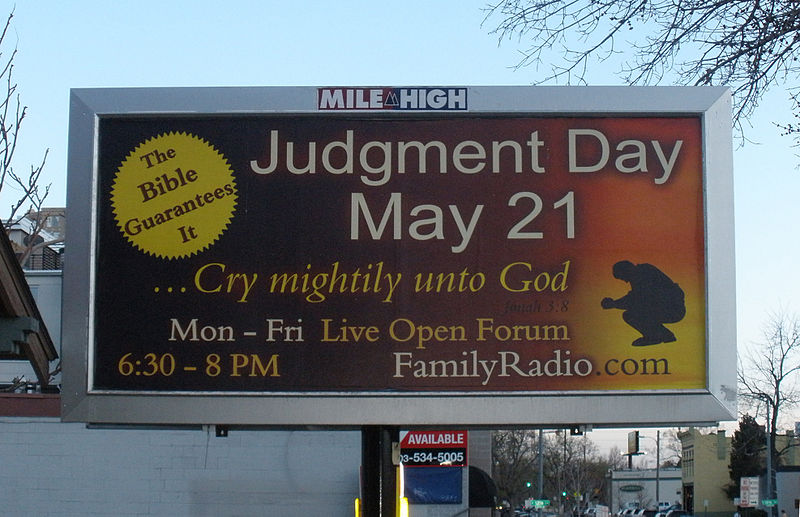When The Rubber Hits The Road
Once again, due to the hectic-ness of life in the “real world,” I was unable to put a video together. Sorry.
This is the last post I’ll be doing on amillennial eschatological theology. If you haven’t figured it out by now, yeah, I’m pretty unapologetic about my belief system. Often, when I discuss this with people who are not Lutheran (like me) and they learn that I am an amillennialist, they’ll make the same joke: “I’m pan-millennialist. I think it’ll all just pan out in the end.” And then we both chuckle and I have to admit that there’s some truth to that. I very well could be wrong in my beliefs. I don’t think I am, but if God has a pre-tribulation rapture in the works, I’m not going to complain.
And yet, at the same time, as funny as that pan-millennialist joke is, we have to remain aware that there can be devastating real world consequences when our theological rubber hits the road, so to speak.
 A good, recent example of this is Harold Camping. I know it’s been a little over a year since that so-called “prophecy expert” shot himself in the proverbial foot by wrongly predicting the end of the world not once, not twice, but three times. Now most of us rightly chalked him up as a kook, but the sad reality is, far too many people fell for his schtick. Many of them donated most, if not all, of what they had to help “get the word out” about the impending judgment day. While I can’t find the links now, I know I read a few interviews with true believers who had sold all that they had in order to travel around the country and make sure that the country knew what Mr. Camping had cobbled together using his “holy mathematics.” Now that it’s a year later, I can’t help but wonder where those folks are now. I suspect that a few of them probably did not land on their feet after blowing the life savings on (let’s call him what he is) a false prophet.
A good, recent example of this is Harold Camping. I know it’s been a little over a year since that so-called “prophecy expert” shot himself in the proverbial foot by wrongly predicting the end of the world not once, not twice, but three times. Now most of us rightly chalked him up as a kook, but the sad reality is, far too many people fell for his schtick. Many of them donated most, if not all, of what they had to help “get the word out” about the impending judgment day. While I can’t find the links now, I know I read a few interviews with true believers who had sold all that they had in order to travel around the country and make sure that the country knew what Mr. Camping had cobbled together using his “holy mathematics.” Now that it’s a year later, I can’t help but wonder where those folks are now. I suspect that a few of them probably did not land on their feet after blowing the life savings on (let’s call him what he is) a false prophet.
Now I’m not saying that an amillennialist would be completely immune to this sort of thing. We can get snookered just as easily as the next guy. But given the fact that our theology doesn’t really support “let’s figure this whole thing out” type thinking (i.e. date setting or flowcharts or anything like that), I don’t think it’s as easy for us to get caught up in the fervor.
That’s just one small example. A much more problematic example is the status of the modern state of Israel.
In dispensational premillennialist thinking, the modern state of Israel’s creation is a big deal. It’s a sign that it’s all about to kick off at any moment. Because of this, dispensational premillennialists have put a lot of pressure on the United States government to side with Israel no matter what they do or how they behave.
Now I’m not saying that we shouldn’t support Israel. Not at all. They are our historic allies and they’re the only stable democracy in the region. But for an amillennialist like me, that’s all they are. They’re not a fulfillment of prophecy. That particular country and plot of land is no longer theologically significant (I’m getting on my asbestos undies now. I have a feeling I’m going to catch some brimstone in the comments for that one). Because of that, I don’t think the Israelis have a whole lot of moral high ground to stand on when it comes to their treatment of the Palestinians. And by saying that, I’m not condoning any form of radical terrorism by the Palestinians. What they do is reprehensible and vile.
But let’s just pretend, for a moment, that the Palestinians got their acts together and, instead of engaging in terrorist attacks, carried out a series of non-violent protests? How many of you would be okay with them getting some land of their own to live on?
And that right there is one of the problems I have with dispensational premillennialism. When it’s rubber hits the road, it results in the oppression of people, many of whom are our brothers and sisters in the faith (since not all Palestinians are Muslim).
That, I think, is why I wrote this whole series on eschatology. I want to shake up the status quo and get people thinking about what they believe and why. It’s not just theory. We have to be careful how our theology plays out when the rubber hits the road.


































And there I have to disagree with you, because Israel’s reformation was miracle after miracle. The six-day war, which they shouldn’t have won, was won by miracles. The weird deal with Richard Nixon’s mother telling him as a boy that someday he’d have a chance to help Israel, so the call came in the middle of the night to aid them or there wouldn’t be an Israel in the morning, and he sent them tanks and jets and everything else, remembering his mom’s words.
Them being recognized as a nation was a miracle.
Good ol’ Chuck Missler has an entire series on whether the church has actually replaced Israel.
http://www.khouse.org/6640/BP038/
He does all the math from Daniel about Israel’s exile, and it comes out to them returning to the land in 1948, and that’s accounting for all the calendar mistakes and things throughout the ages.
There’s too many miracles connected to Israel to just throw them out. They’re still God’s people. Those who bless them are still blessed (and there’s very few of those anymore, especially America), and those who curse them are still cursed.
Well, I don’t do math — numbers make me break out in hives. But I agree with Kessie in that Israel is extremely significant. Historically, presently, and prophetically. It would be hard for this foundational fact to be be overstated. But it’s too big a subject for this venue.
I completely agree with John, however, that we must be very careful how our theology plays out when the rubber hits the road.
Paul in Romans 11 holds out clear hope, inspired by the Spirit, that the original Israel will be back. In effect, the light to the nations that the original Israel was always meant to be will have illuminated the Gentiles, then come back around to original Israel. Thus I believe Israel’s re-established role as a nation is significant, though not as significant as, or in the way that, dispensational sorts may believe.
Re-reading through a book such as Isaiah or Ezekiel, it is very hard to “spiritualize” passages that promise restored Israel as physical land and mountains without doing injustice to the text. However, I’m inclined to believe these refer to a re-established physical Israel in the New Heavens and New Earth. It may be because of Christians’ neglect of resurrection truths that we keep trying to “fulfill” those promises early.
Stephen, I was going to hit the thumbs up button until your last couple sentences.
There really is too much in Scripture, from God’s first promise to Abraham on through Revelation, to think that God has stopped working with purpose in national events, with Israel at the hub.
But I don’t know anyone who thinks that we are to ‘keep trying to “fulfill” those promises.’ God fulfills His promises. That He works through people at His initiative, is clear in Scripture, not through our initiative. He gives the faith and the grace, He reconciles, He leads, prompts, moves, draws, convicts, calls.
Regarding the events we know as the end times, Jesus Himself said we are to recognize the times.
That ought not equate with the kinds of false teaching that provides timetables because Christ also said, in that same passage
The error that someone like Harold Camping makes, it seems to me, is to believe that he knows better–that he, in fact, could figure out the day and hour. It’s a clear violation of Scripture.
But because we don’t know when doesn’t mean we don’t know what. How is another question, and who, of course, is another unknown as far as the human players. Jesus we know as the victor, and Satan we know as the loser.
The greater question to ask, I believe, is why we have these prophecies–the ones Jesus made in Matthew and those in the Old Testament that seem to have a near and far fulfillment, and of course, those in Revelation.
I don’t think they were given so we can make timetables and flow charts. I think they are there to remind us that Jesus Christ is coming back; that even though the days grow evil, yet there is hope; that we are to stand firm and contend for the faith, even in the face of growing apostasy.
Becky
Oh, I eagerly agree that may be true! My main point is that many texts in those two books of prophecy speak of a permanent fulfillment of those prophecies. God does not simply abort His promises to Abraham, Isaac, Jacob, and the nation of Israel; He will give a redeemed Israel its land, physically, for eternity — in the New Earth.
With that in mind, the 1940s restoration of the land of Israel may be a step toward that, but we’re still waiting on the renewal of creation and the eternal paradise.
For example in Ezekiel 6 Ezekiel must prophesy against the mountains of Israel, the whole land, literally, but also symbolic of its people. God will destroy the nation and send the people into exile — at this point in the prophecy, without hope and suffering their sin’s results. Then as the bodies lie slain all over the land, wherever they worshiped idols, He says He will “stretch out my hand against them and make the land desolate and waste, in all their dwelling places, from the wilderness to Riblah. Then they will know that I am the LORD” (Ezekiel 6:14).
Tough material, and perhaps some Christians get stuck there. But then the whole thing is reversed just 30 chapters later — a chapter before the famous dry-bones chapter (37) and the same chapter in which God promises a New Covenant. Here we have perhaps the most significant Old-Testament promises of resurrection: physical resurrection of the land, and spiritual and physical resurrection of humans. The prophet instead prophesies to the mountains:
Thus, prophecy clearly indicates that the land of Israel, both literal/physical and as a symbol of the people of Israel, will someday have a homeland there, forever. This would rule out both suspicions that God will nuke the Earth in favor of a “spiritoid” alternate reality, and suspicions that the Church has “replaced” Israel.
One may believe this, I’m sure, while rejecting excesses of dispensational theology, or one may believe that without also accepting dispensational beliefs at all.
Again, Stephen, I am mostly in agreement with what you say, but the little part I question is connected to what I believe is an assumption on your part:
Because I believe in layered fulfillment of prophecy, I don’t see any reason why God can’t fulfill His promise to restore Israel and to call them back to Himself before the judgment. Some people believe that will happen when He miraculously saves the nation from the assault of the Antichrist and his forces.
As I said earlier, I don’t think the when is something I need to worry about–mostly because it is not something God has revealed to us. I believe there are many iterations of the sin of Harold Camping, and I don’t want to get caught up in any of them.
Becky
I do believe that God still has a role for Israel the nation in his plan, as well as “spiritual Israel,” whether the latter is comprised of the church or not. Beyond that…I’m not sure. That the nation of Israel exists shows that something miraculous was going on–but I’m not sure what.
I figured my comments about Israel would stir things up. 🙂
While I’ll admit that Israel has done well, I still don’t buy that they are the fulfillment of anything. The modern state of Israel is a secular democracy with a strong religious minority influencing its government. That’s far and away from a theocratic monarchy. That, plus the statements that Paul makes in Romans, Galatians, Ephesians, and elsewhere, plus the way Peter applies Old Testament titles of Israel to the Church, and some of the things Jesus says to the Church through John in Revelation, makes it very hard for me to believe that a nation called Israel has any significance for the future. But that’s just me. Like I said in the post, I could be wrong. If I am, I’ll find out.